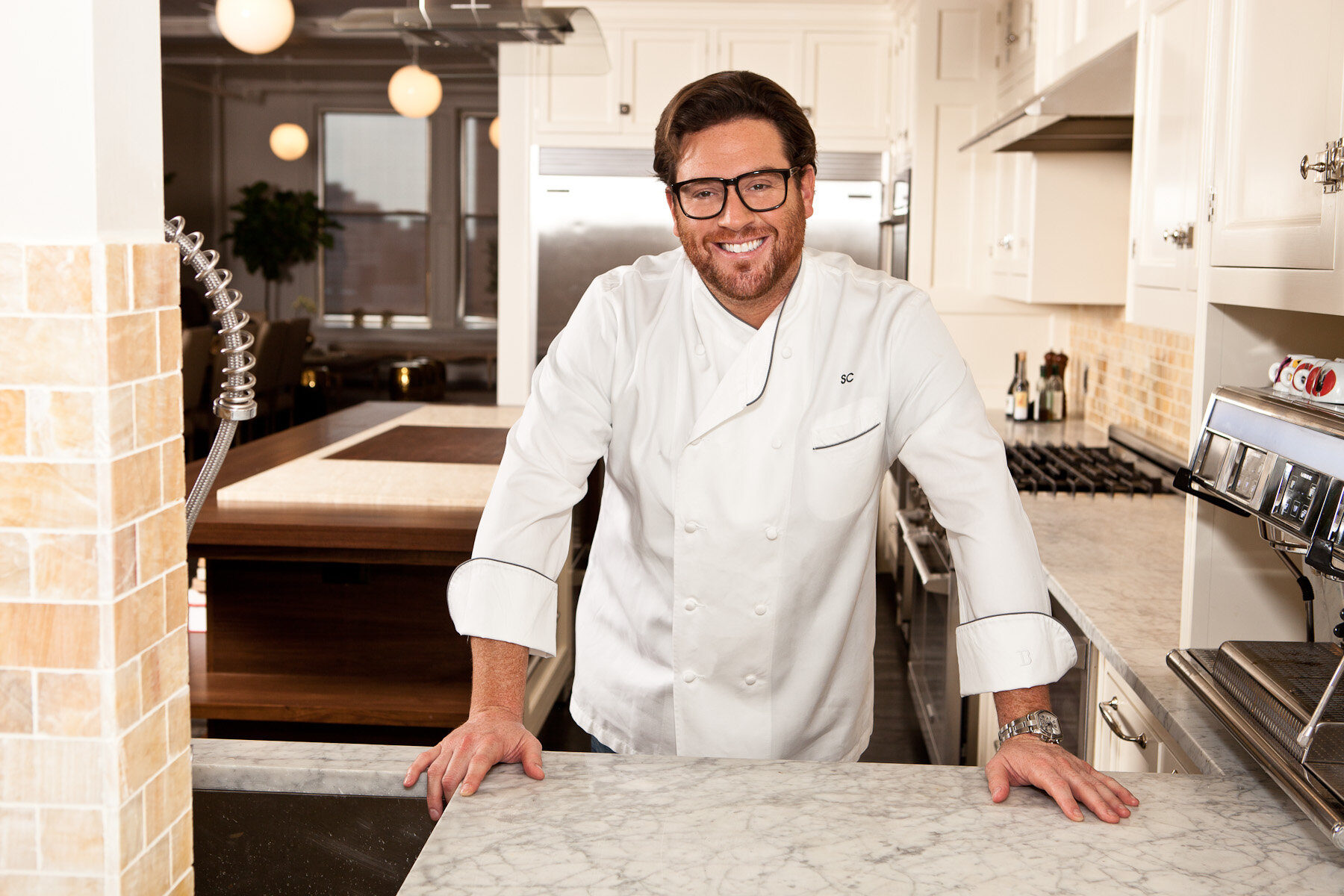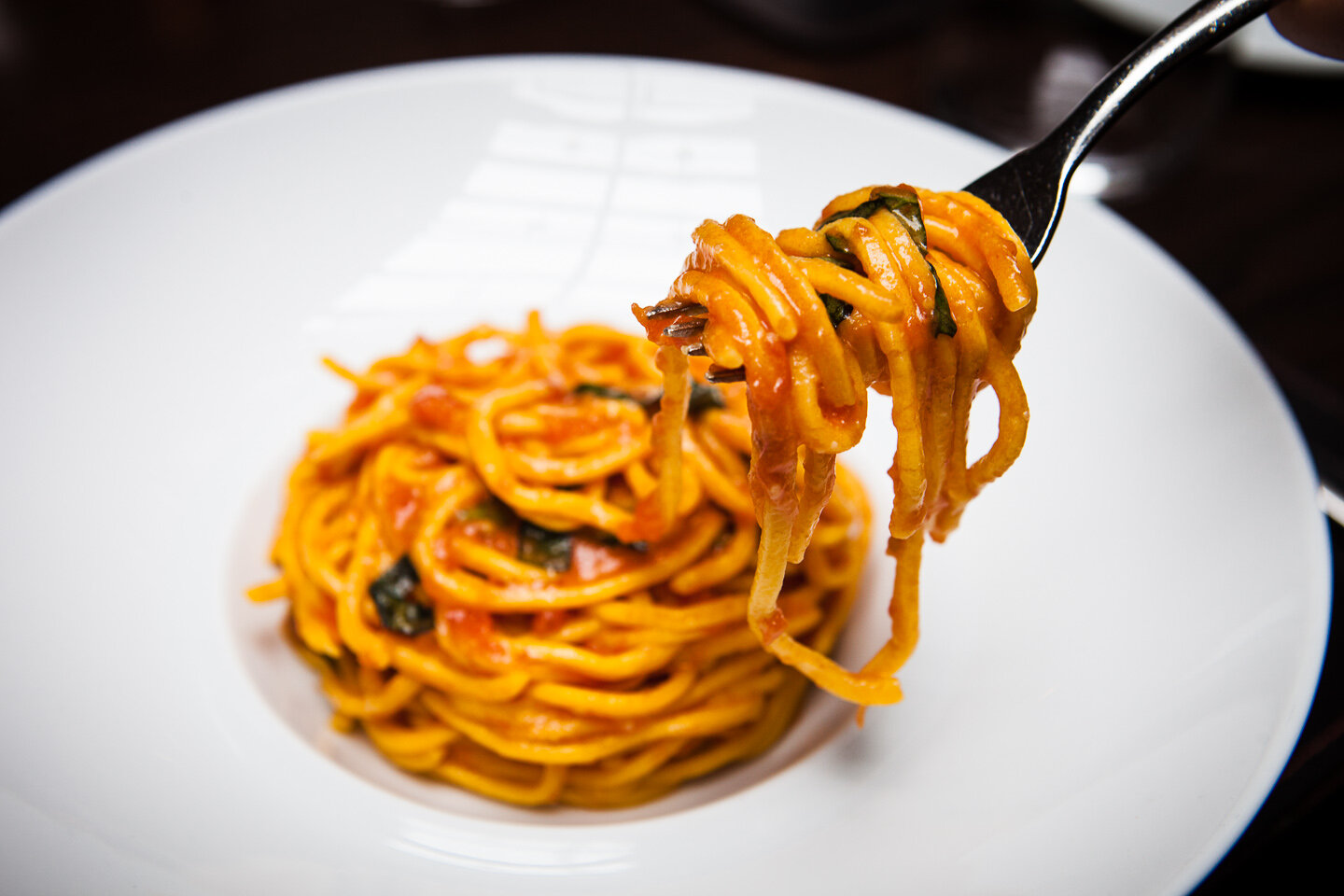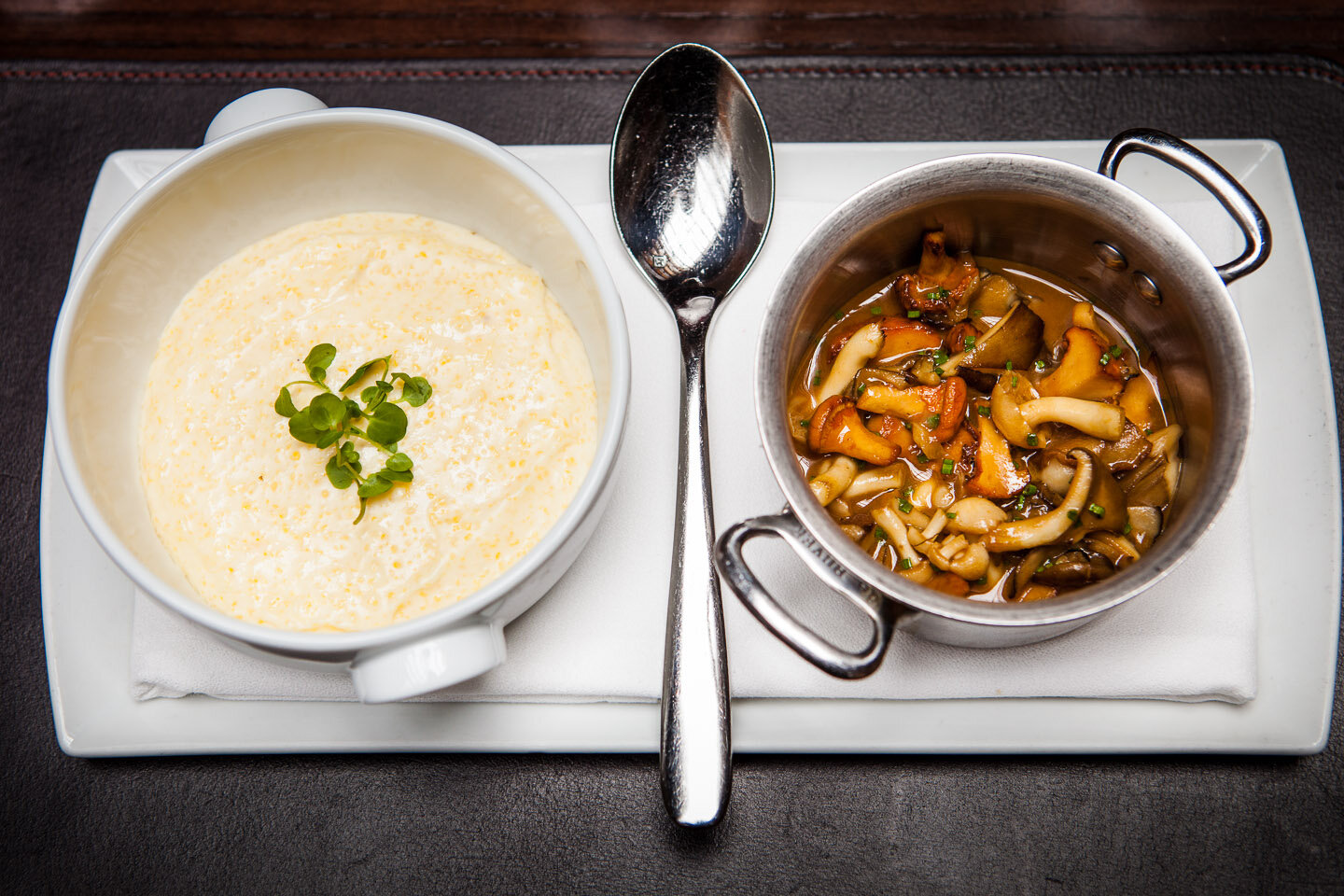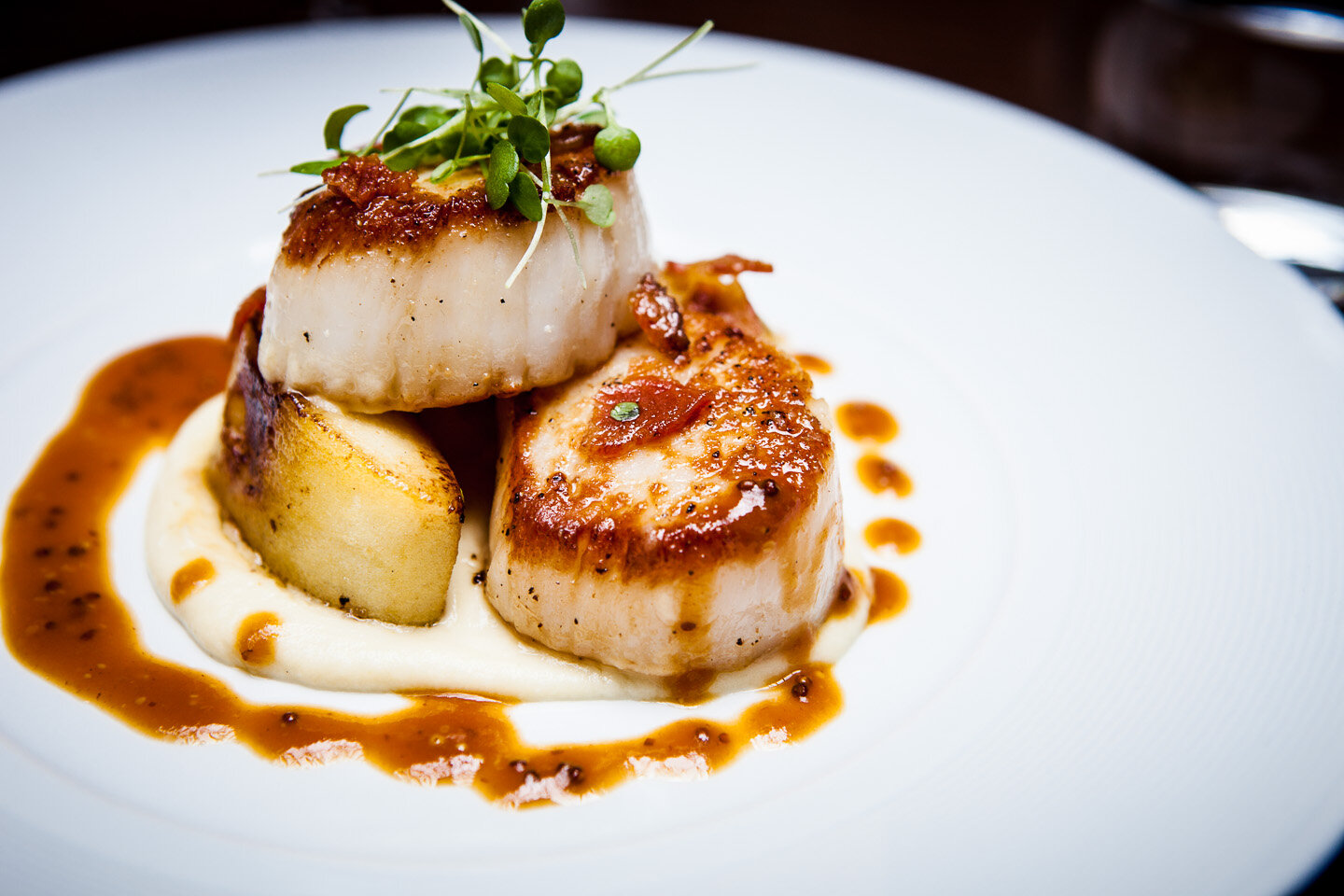Portraits and Plates by Scott Conant

Portraits and Plates by Scott Conant
Interview taken November 2012
My grandmother. The origin of my cooking story goes back to my maternal grandmother, Carminella Fusco Varrone.
I grew up in an Italian-American family; my mother is first generation. I have memories of walking through my grandparents’ garden, eating radicchio and fennel, and the smell of basil -- I can’t smell basil to this day without thinking of my grandfather.
I always tell people there was just something about my grandmother. I was young when she died, but I still have these vivid memories of her: the way she would invite people into her home and her sense of old-world hospitality. You don’t have to be Italian -- old-world hospitality means something to everyone. So many of us say, “I remember my grandmother” or “I remember the way it used to be.” Right? Those things have always stuck with me.
I’m from Waterbury, Connecticut -- a very blue-collar town. I was young when I got into food. I was eleven when I took my first classes and fifteen when I started working full time. I played a lot of sports as a kid, and I felt the same camaraderie you would find on a team the first time I walked into a kitchen; that same sense of togetherness. Everyone was an individual but they worked together simultaneously. That combination resonated with me.
I noticed that the closer you got to New York City from Waterbury the better the restaurants were -- the better the food was. I was scared to death of working here. I didn’t think I was good enough. I questioned myself constantly. I remember a chef at CIA – Maury Cantor – I had a sit-down with him and I was like, “You know, I’m really nervous about working in New York. Do you think I can do it?” He was like, “What are you talking about? Of course you can do it.” It was really sweet. I wasn’t necessarily the same as I am now: I was a little brash young punk, and insecure, I guess. I haven't been accused of being insecure recently, anyway.
For me, moving to New York was really about facing my fears and stepping up to the plate. So I faced my fear.
I walked into this kitchen at San Domenico, on Central Park South, and was the only American in this kitchen full of Italians. I got my ass kicked. “You stupid fucking American, you don’t know shit!” They weren’t wrong. They could have been a little nicer about it, but they weren’t wrong. It was good -- Ha! -- It was the best thing I ever did. It changed my life. Twenty-three years later, I’m still here.

I can’t relate anymore to who I was then. Who I was then and who I am now have nothing to do with each other with the exception of my name. My ideology is different. So I can’t even think as to what a dish of mine from that period would look like, other than that it would represent me as a person: a little rough around the edges, a little misguided perhaps, with a little youthful ambition borderlining naiveté. The food that I cook now balances rusticity and elegance; the representation of myself as an adult. (Some would argue the “adult” thing, but let’s just say age is no sign of maturity, right?)
There are a million dishes that represent me now…. The creamy polenta with fricassee of truffle mushrooms is earthy and honest. There’s sincerity to it, but also refinement. It’s something that everyone can appreciate and relate to, but there’s something special and unique about it. At least that’s what my ego tells me. I mean, you do on a daily basis and think, “OK, it’s a polenta for crying out loud!” But how do you take something that’s a commodity of the Italian kitchen and make it special and make it unique? Spaghetti with Tomato Basil; how do you make that special?
Simplicity is an incredible amount of work. To make something as simple as a risotto takes a tremendous amount of work and understanding. To make sure, as you stir, that the starches are out and there’s enough fat inside to create this emulsion, and that it’s reduced down at the right temperature, and that the heat of the stock is perfect so that within an 18-19-20-minute time frame everything comes together perfectly -- that’s the challenge. When do you add the butter, and when do you not? There’s a lot of restraint; there’s a brake and a gas pedal, and you have to find that balance between the two in order to achieve something that’s a true reflection of the inherent flavors of what the product
There’s a lot of restraint. There’s a brake and a gas pedal, and you have to find that balance between the two in order to achieve something that’s a true reflection of the inherent flavors of what the product was to begin with.

People don’t know these stories, but I’ve been broke four times in my life. As in completely broke where I was like, “Holy shit, what am I going to do?” Like, I got eviction notices because I just wanted to cook the food that I wanted to cook and forget about the rest of the world. My roommate at the time would give me his rent check and I would put it in my account, and instead of paying the rent I would withdraw the money and pay my staff because my staff wasn’t getting paid either.
But I had this one couple that would come every Thursday night at six o’clock, and they would give me a hundred-dollar handshake. And that hundred dollars got me through the week. The entire week, until the next Thursday when they came in.
The take away from that -- from every negative experience -- was “OK, I’m never gonna put my staff in that situation.” My struggles should be my struggles, they shouldn’t be their struggles. If I can’t pay you, I’ll put you in a place where you can get paid. If I can’t pay you then I shouldn’t have this business right now. You know what I mean?
I can never let the business get so far ahead of the quality. The function of business and the personal element of art have to be in balance. That’s what it’s all about. That yin and yang of the food and the experience and the ambiance of the room need to be in perfect balance. Through the negative experiences, you learn integrity, hopefully. That’s the goal. Without becoming too cerebral about it, at the end of the day it’s soulful.

The interesting thing about cooking in New York now is that there is always someone better than you. There is always a restaurant that’s doing better, regardless of the cuisine, and there are always chefs cooking more interesting things than you are. And the world has gotten smaller; a lot of chefs from all over the world are here now. Some of them are welcome, some of them aren’t.
But New York is home. Now I have a wife and two kids, so it’s a very different situation that I find myself in and I think about cooking here in a different manner than I did thirty years ago. New York is my hub, my resting place, my base, my foundation. Some of the best chefs and the best cooks and the best food in the world are here. Some would argue that it is the best place in the world – I believe that. So to be able to make your mark in a place like this is incredible.
When I got here there was a lot of animosity between chefs where there was always this trying to one-up one another. I think it’s still like that, but by trying to one-up one another you become enthusiastic for other chefs as well, if that makesany sense. There’s more enthusiasm for everybody. A lot more enthusiasm.
I see chefs with their first restaurants like George Mendes. I’m so happy for that guy, I love what he’s doing. He’s just such a good cook! Michael White; I love what he’s doing, and I think he’s building an amazing company that’s to be commended. And then you look at the big guns, the old guard. Daniel Boulud, continually evolving. Thomas Keller with Per Se, which has been open for five or six years now and is still amazing, required eating for people in the food industry. Jean-Georges has done a million things since his first restaurant and is still amazingly relevant, still on top of the food world. Eric Ripert at Le Bernardin. David Bouley. So as big as New York City is, it’s also incredibly small, and there’s just more enthusiasm for everybody. A lot more.
There are so many foods that make me think of New York, from the smoked fish at Russ & Daughter to the comfort that is a New York City bagel. But I always think about that one dish that completely blew me away.
I was sitting at Le Bernardin and I had this little pasta with sea urchin on top of it, and I think there was a langoustine in there or something. The simplicity and the brilliance of it – the composition, the balance – still blows me away. I spoke to Eric about it and he was like, “But it’s just the ingredients that make it brilliant.” And that’s the humility of Eric and the kind of genius of someone like him, where you can have such an amazing dish and be like, “It’s not about me, it’s about the ingredients.”
But someone had to put those things together obviously and, again, that recognition and that restraint…. That represents New York to me. That experience of having something in this crazy, bustling city with all this mayhem going on, and then suddenly it becomes about nothing but this right there; that honed in focus. Holy shit. This is what it’s all about.

